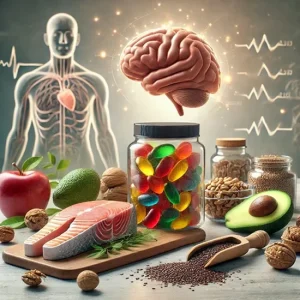What is Stress?
Stress is the physiological or psychological response of the body to situations or events encountered in the course of life. Being stuck in traffic, financial difficulties, family problems, work-related pressure, and academic concerns such as homework, projects, or exams can all trigger stress. Whether stress is beneficial or harmful depends on its intensity and duration. Short-term stress can motivate individuals and enhance their performance, while long-term stress may have negative effects on both mental and physical health. Some people manage stress easily, while others struggle with its impact. Which side are you on?
The Brain’s Alert System: Stress Hormones
The brain is equipped with an alert system designed to protect us from potential threats. When it detects danger, it sends signals that trigger the release of hormones, increasing heart rate and blood pressure. Stress hormones such as cortisol and adrenaline play a key role in this process. This “fight-or-flight” response prepares the body to react swiftly, helping us cope with challenging situations.
What Are Cortisol and Adrenaline?
As experts state, the hypothalamus in the brain stimulates the adrenal glands, triggering the secretion of adrenaline and cortisol. These hormones prepare the body for action by increasing heart rate, respiration rate, blood pressure, and metabolism, ensuring greater blood flow to the muscles. Pupils dilate, blood sugar levels rise, and sweating occurs to help regulate body temperature. Thus, the body remains alert and ready to respond quickly under stress. However, when cortisol levels remain high for a prolonged period, it can damage cells. Chronic stress leads to continuous hormone secretion, which may cause health issues such as hypertension and ulcers.
The Negative Effects of Stress
The negative effects of stress can impact the entire body. When stress levels rise due to the secretion of hormones like cortisol and adrenaline, they may cause various health issues if they do not return to normal levels.
Suppressing the Immune System
This may increase the likelihood of getting sick. People may become more susceptible to illnesses, and the healing process may take longer.
Heart and Circulatory System Problems
High levels of stress may increase the risk of high blood pressure, stroke, and heart attack.
Digestive System Problems
Conditions such as ulcers and irritable bowel syndrome may develop due to stress.
Psychological Problems
Stress is one of the primary causes of depression and anxiety disorders.
How to Manage Stress?
Have you ever thought about how to manage stress? What works best for you?
Time Management
Time management is a key step in stress management. By planning your daily schedule or current tasks effectively, you can reduce time-related anxiety and pressure. This may help you feel more relaxed and in control.
Regular Exercise
Physical activity and exercise stimulate the release of endorphins, which help reduce stress levels and improve mood. Taking a walk in nature is always a great option—it allows both the mind and body to relax. These walks and exercises also contribute to a more positive mindset.
Positive Thinking
Overthinking and excessive worries can lead to both emotional and physical stress. Focusing on positive thoughts and perspectives instead of negative ones can help you feel more relaxed. This shift in mindset may also change the way you perceive stress.
Socializing and Support Systems
Spending time with people you enjoy being around: Building strong relationships, having meaningful conversations, and occasionally sharing your thoughts can help relieve stress and shift your mindset toward positivity. Spending time with family and friends can be a great choice.
Relaxation Techniques
You can also focus on meditation, mindfulness, breathing exercises, or taking up a new hobby.
The Relationship Between Stress and Nutrition
Aside from all these alternatives, focusing on things that make you feel good, changing your nutritional habits, avoiding processed foods, eating healthy, and taking supplements can positively affect your mood. Making lifestyle changes that you believe will benefit you can help manage stress.
Increasing your consumption of fruits and vegetables enhances vitamin and mineral intake, which can contribute to a better mental and physical state.
Vitamins and Plant Extracts That Help Reduce Stress
Did you know that certain vitamin and mineral deficiencies can lead to stress?
And have you ever heard that some plant extracts can help manage stress?
Omega-3
High stress levels can deplete Omega-3 stores in the body. Research has shown that individuals consuming high doses of Omega-3 experience a reduction in anxiety symptoms.
Vitamin D
Vitamin D deficiency can occur under prolonged stress. Interestingly, replenishing your Vitamin D levels may help mitigate the negative effects of stress.
Vitamin C
The effect of Vitamin C on oxidative stress is one of its most well-known properties. It is considered one of the strongest antioxidants and may help lower cortisol levels.
B Vitamins
B vitamins, including B1, B3, B5, B6, and B12, play a crucial role in reducing stress.
- Vitamin B1 (Thiamine): Deficiency may lead to fatigue, depression, irritability, anxiety, and even suicidal thoughts. It is also associated with memory impairment, loss of appetite, insomnia, and digestive issues.
- Vitamin B3 (Niacin): Deficiency at low levels may contribute to anxiety, mental and physical sluggishness, and irritability.
- Vitamin B5 (Pantothenic Acid): Insufficient intake may be linked to chronic fatigue, weakness, and a depressive mood.
- Vitamin B6 (Pyridoxine): Essential for the synthesis of serotonin, melatonin, and dopamine. Although its deficiency is rare, it may lead to psychological imbalances.
- Vitamin B12: Deficiency can cause symptoms such as sudden mood changes, paranoia, irritability, cognitive fog, dementia, hallucinations, and mania.
Adaptogens: Ashwagandha and Rhodiola Rosea
Additionally, adaptogens such as ashwagandha and Rhodiola rosea may help balance the inner world.
- Ashwagandha: Recently gained popularity as a stress-reducing herb and is known for its ability to lower cortisol and reduce stress levels.
- Rhodiola Rosea: One of the most important adaptogens which provide relaxation after high stress and anxiety. Its role in balancing high tension is undeniable. Studies on exhausted people show reducing stress levels.
Melatonin and Supplements for Stress
Melatonin is a hormone naturally synthesized in the body. It is primarily associated with sleep; however, studies have shown a connection between melatonin levels and conditions such as anxiety, depression, insomnia, and sleep disorders. When melatonin production is insufficient, supplementation may help alleviate these issues.
In Summary
By making small changes in our lifestyle based on our deficiencies and needs, it is possible to alleviate mild psychological and physiological issues. After reading this article, which change will you start implementing to reduce stress in your life?
Now is the perfect time to meet chewable gummy supplements from Your Gummie! Take two gummies daily and relax your mind.
References
https://www.medicalnewstoday.com/articles/vitamins-for-stress
Magnezyum ve stres – merkezi sinir sisteminde magnezyum – NCBI … 4 Haziran 2023’te erişildi. https://www.ncbi.nlm.nih.gov/books/NBK507250/
Chandrasekhar K, Kapoor J, Anishetty S. A prospective, randomized double-blind, placebo-controlled study of safety and efficacy of a high-concentration full-spectrum extract of ashwagandha root in reducing stress and anxiety in adults. Indian J Psychol Med. 2012 Jul;34(3):255-62. doi: 10.4103/0253-7176.106022. PMID: 23439798; PMCID: PMC3573577.
Triantafillou S, Saeb S, Lattie EG, Mohr DC, Kording KP. Relationship Between Sleep Quality and Mood: Ecological Momentary Assessment Study. JMIR Ment Health. 2019 Mar 27;6(3):e12613. doi: 10.2196/12613. PMID: 30916663; PMCID: PMC6456824.




